







By Imam Dr. A. Rashied Omar
We are now well into the sacred month of Dhul Qa’dah, the eleventh month of the Islamic lunar calendar, and with it, we have entered a season of profound spiritual significance.
This period marks the threshold of the sacred days of Hajj, an annual opportunity for Muslims across the world to renew their intentions, elevate their worship, and deepen their connection with Allah, the Lord of Compassion and Mercy.
Dhul Qa’dah is not an ordinary month. It is the first of the four sacred months
(al-ashhur al-ḥurum) mentioned in the Glorious Qur’an, in which warfare is traditionally forbidden and reverence for divine ordinances is especially emphasized. Allah, the MostHigh, proclaims in Surah al-Tawbah (9:36): “Indeed, the number of months with Allah is twelve... of which four are sacred.” The Prophet Muhammad (pbuh), as recorded in Bukhari, identified these sacred months as Dhul Qa’dah, Dhul Ḥijjah, Muḥarram, and Rajab.
What renders Dhul Qa’dah particularly special is that it not only belongs to the quartet of sacred months but also spans the season of Hajj and inaugurates its sacred days. Allah, the Most High, proclaims in Surah al-Baqarah (2:197): “The Hajj is [during] well-known months.” The Prophet Muhammad (pbuh) clarified that these months are Shawwāl, Dhul Qa’dah, and the first ten days of Dhul Ḥijjah. Classical scholars such as alṬabarī, al-Qurṭubī, and Ibn Qudāmah affirm that Dhul Qa’dah uniquely spans both the sacred months and the entirety of the Hajj season.

This rare dual honor and distinction calls us to approach the month with deep spiritual consciousness, reverence, and purposeful preparation.
For those preparing to respond to the sacred call of Hajj, this is a time for profound spiritual readiness. The pilgrimage is far more than a physical journey across distance, it is a transformative voyage of the soul. It calls for purification of the heart, deep mindfulness of the Divine Presence, and a renewed recommitment to ethical conduct. Allah, the Most-High, reminds us in Surah al-Baqarah (2:197):”Take provisions, but indeed, the best provision is taqwa (God-consciousness).” Taqwa is not a fleeting emotion or private sentiment. It is a sustaining moral force, that guides our speech, shapes our choices, and attunes our hearts and innermost selves to the Divine Will of Allah. Thus, the true pilgrim does not merely prepare with passports and logistics but approaches this sacred obligation with humility, repentance, and spiritual sincerity. For those who have not yet undertak-
en the Hajj, this season is a call to awaken the longing in your heart. Do not wait for old age or ideal circumstances. The Prophet Muhammad (pbuh), in a poignant hadith found in the Musnad of Imam Aḥmad, exhorted: “Hasten to perform the Hajj, for none of you knows what may befall him tomorrow.” This is a timely spiritual reminder of the fragility of life. What we defer today may remain undone forever. We pray that Allah inspires within the hearts of the believers a sincere intention and opens the path to those who yearn to respond to His sacred invitation.
Even for those of us who are not journeying to Makkah this year, the sacred season of Hajj embraces us with its radiant spiritual light. We are invited to partake in its barakah through acts of devotion, most notably by fasting on the Day of Arafah, the ninth of Dhul Ḥijjah. On this profound day, as the pilgrims stand upon the plains of Arafah near the Mount of Mercy, their hands raised in earnest supplication, we too are called to seek Allah’s forgiveness and grace. The
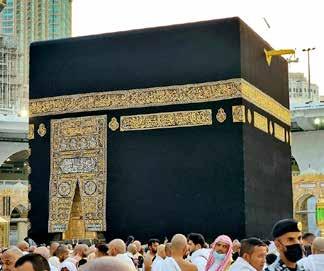
Prophet Muhammad (pbuh) taught that fasting on this day for those not performing Hajj expiates the sins of the previous year and the year to come. It is a deeply moving and powerful moment of spiritual solidarity with the hujjāj and a sacred opportunity for inner purification and renewal. Let us seize this sacred season with a heart inclined to worship, repentance, and generosity. Let us increase our prayers and our acts of goodness, for this is a time in which divine mercy descends in abundance.
We pray that Allah grants all the pilgrims safe travels to al-Masjid al-Ḥaram in Makkah and all the other
holy sites, blesses them with good health, and grants them a divinely accepted hajj mabrur and a great forgiveness. And may they return as renewed souls, bearing the spiritual fruits of their sacred journey.
As we dwell in the sacred light of this blessed season of Hajj, may Allah, the Most Compassionate, envelop our ummah in boundless compassion, unite our hearts upon truth and righteousness, and grant freedom and dignity to all those who are oppressed, especially our beloved sisters and brothers in Gaza, and all those across the globe suffering under the weight of injustice. Allahumma Amin.


By Nabeelah Shaikh
group of vibrant young changemakers from the Muslim Youth Movement of SA’s Ambassadors for Change programme recently lit up the faces and hearts of elderly residents at the John Conraide House in Durban.
On 29 April, during a moving and joyful visit as part of their community upliftment initiatives, they spent time at the retirement home, entertained the elderly, and treated them to delicious snacks.
The visit, led by students from Al-Falah College and Orient Islamic School in partnership with the Islamic Guidance AFC team, demonstrated the immense impact that youth can have when driven by compassion and purpose. The day was filled with laughter, fun, and meaningful connections.
“It was lovely to see the genuine joy and excitement from the elderly there. You could see how much it impacted them, how it made their day, and I feel it in turn impacted us as well, as it allowed us to see just how



much something that may seem insignificant can im pact others,” said volunteer Amir Elhashash.
One elderly woman, over come with emotion, told the volunteers: “I feel so loved by today’s visit. Thank you, young people.”
Another grateful resident added: “You have spoilt us and we love you for mak ing time for us and bringing us the most delicious eats. Blessings to you.”
For Ambassadors for Change student Afsa Makangila, who spearhead ed the planning of the event, the experience was deeply profound.
“Subhanallah, the expe rience was unmatched. I didn’t expect them to be that happy and grateful for the little that we did. Every one brought something to the visit to make the event extra special, be it scones, biscuits, or hot dogs. We had a variety of snacks, both sweets and savoury,” she said. She said it was person ally an eye-opening expe rience for her. “We helped them get out of their com fort zone, but it was such an amazing and beautiful expe














By Nabeelah Shaikh
Despite being blind, Azraa Ebrahim has shattered expectations and soared to academic heights, graduating from the University of KwaZulu-Natal with 14 distinctions this week.
Her journey began amidst the disruption of a global pandemic, having started her studies during the height of COVID-19. Ebrahim graduated cum laude with a Bachelor of Social Science degree, majoring in Religion Studies and Industrial Psychology. She began her studies when all learning was shifted online. Navigating virtual platforms was especially difficult for her due to accessibility limitations. However, with determination and the support of her parents, lecturers, peers, and the University’s Disability Support Unit, she was able to transition successfully to in-person learning. A white cane and assistive tools like screen readers became critical parts of her academic toolkit.
“To ensure I was personally competent, I would begin exam and test preparation a
month in advance to account for my slow reading pace. Despite my initial challenges, I am immensely grateful for the relationships I’ve built, the knowledge I’ve gained, and the friends I’ve made along the way,” said Ebrahim. She was born with a rare eye condition known as bilateral congenital optic atrophy.
“There isn’t a lot known about this condition, or about how I got it. We are unsure if it’s genetic or not.
Unfortunately, that testing isn’t available in South Africa at the moment. But in a lot of cases of people with this condition, their vision starts to worsen more and more as they get older,” said Ebrahim.
Beyond excelling academically, Ebrahim also distinguished herself through research and public speaking. She presented a paper at the Association for the Study of Religion in Southern Africa Conference 2024, where she won Best Student Paper and was subsequently invited to publish her work in the Journal of Islamic Studies. She also spoke at the TIP Eid-ul-Adha Eidgah, delivering a sermon that touched on her personal experiences
of growing up blind and facing discrimination.
Collaborating with Dr Cherry Muslim and Chukwudera Nwodo, Ebrahim also presented at UKZN’s Academic Monitoring and Support Colloquium 2024. Their presentation earned them the Best Paper award in their concurrent session, and this was yet another testament to Ebrahim’s academic calibre.
Balancing academic responsibilities with family life wasn’t always easy for her.
During exams, she had to plan meticulously to manage her commitments. Karate became a vital outlet to decompress and maintain mental health.
She credits her parents for keeping her grounded: reminding her to rest, eat, and care for her vision. Offering encouragement to other students facing similar challenges, Ebrahim said: “Wear your disability with a badge of pride. Do not look upon it with disgrace, nor attempt to conceal it from societal scrutiny. Disability is often painted as a societal afterthought, but it is important
to remember that while our disabilities are integral to who we are, they do not define us entirely. In a world engulfed by discrimination, stigma, and alienation, we must celebrate our uniqueness and challenge socially constructed ways of being.”
Reflecting on her graduation, Ebrahim acknowledged the cultural significance of her achievement.
“Within Muslim communities, it is an uncommon reality for a differently abled Muslim woman to attend university - let alone graduate cum laude. While three years of dedication and determination preceded this moment, I take equal joy in the journey that brought me here,” she said. Ebrahim also paid tribute to her loved ones and mentors.
“To my grandfather, who passed away in 2022, I let your wisdom and memories guide me always. I am immensely appreciative of my supervisor and mentor, Dr Cherry Muslim, whose immense belief in me warrants more recognition and admiration than I could ever express,” she said. As
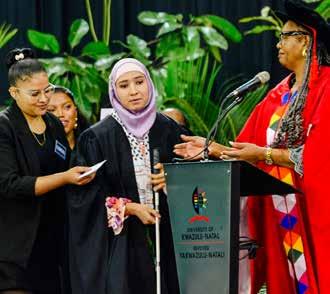
an Honours General Scholarships recipient, Ebrahim is now pursuing her Honours degree in Religion and Social Transformation under the guidance of her mentor, Dr Muslim.
Her research delves into women-led khutbah (sermons) in Islam, aiming to bridge the gap between scholarship, faith, and activism. She wants to move on to pursuing her Master’s degree, and later, a PhD.
“I aspire to be a scholar of Islam and endeavour to eventually enter academia,
to pedestalise research on disability from a differently abled positionality. There is not a lot of research on disabilities within Islam. A lot of it tends to be done by people without disabilities. I would like to fill that gap and shed more light on disabilities within Islam,” said Ebrahim.
Ebrahim said her story should be viewed as a beacon of hope and inspiration, not just for students living with disabilities, but for anyone striving to overcome adversity in pursuit of their dreams.
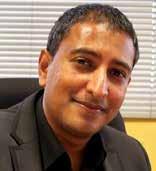
By Imraan Buccus
South Africa is in deep crisis. The scale of unemployment, the collapse of public services, the precipitous decline of major cities, and pervasive corruption have left many people disillusioned. The ANC, once the bearer of our democratic hopes, has squandered much of its legitimacy. It would be naïve to deny these failures. But amid this bleak domestic reality, there is one area where South Africa has stood firm and offered rare global moral leadership: its unwavering support for the Palestinian people. That principled stance, culminating in the genocide case against Israel at the Interna-
tional Court of Justice, has resonated across the globe and reminded many of what ethical internationalism can look like in an age of cynicism.
It is precisely because of this moral clarity that William Gumede’s recent call in the Sunday Times for rapprochement with Israel is so alarming. In his piece, Gumede argues that the Government of National Unity should reinstate ties with Israel, drop its genocide application at the ICJ, and learn from countries like India and China that have maintained economic relations with Israel despite ongoing atrocities. But this position is morally indefensible. At a time when the Israeli state is executing a campaign of mass slaughter in Gaza — described as genocide not just by South Africa but by leading legal scholars, UN experts, and global human rights organisations — to advocate normalisation is to capitulate to power over principle.
Gumede couches his argument in the language of pragmatism. He invokes
For South Africa, a country whose freedom was won with the solidarity of the world’s peoples, to turn its back on another people facing annihilation would be a betrayal
of our history and of the very idea of justice
trade, technology, and economic growth. But there are moments in history when pragmatism, stripped of principle, becomes complicity. The brutal reality unfolding in Gaza — the killing of over 50,000 people, the use of starvation as a weapon, the targeted bombing of hospitals and schools — is not a side -
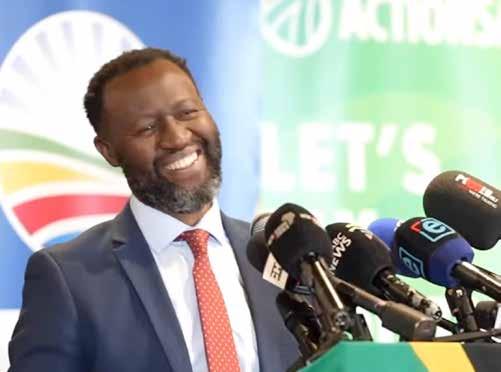
show to be politely ignored while we talk commerce. It is the central question of our moral standing in the world. For South Africa, a country whose freedom was won with the solidarity of the world’s peoples, to turn its back on another people fac ing annihilation would be a betrayal of our history and of the very idea of justice.


International Development (USAID), the Westminster Foundation for Democracy (WFD), and the International Republican Institute (IRI). USAID and the IRI are part of a wider ecosystem of ‘democracy promotion’ that drives the foreign policy objectives of the US.
Continued on page 5



For decades the United States Agency for International Development (USAID) was one of the central institutions in this ecosystem. USAID, operating under the guidance of the U.S. State Department, allocated billions annually to advance what it called development and democratic governance. But it did so in ways that reinforced U.S. economic and geopolitical interests.
In November 2023, Democracy Works Foundation (DWF) was awarded a $4.5 million cooperative agreement by the U.S. Mission to South Africa. This funding directly tied the DWF to a foreign government with a long record of shielding Israel from international accountability.
Of course, Donald Trump’s presidency took an axe to USAID, as part of a broader shift in U.S. foreign policy away from multilateralism and soft power diplomacy toward a more openly coercive and transactional posture. However, this retreat from traditional “democracy promotion” strategies does not fundamentally alter the ideological infrastructure that organisations like Democracy Works Foundation are part of. In fact, in the
context of declining funding, there is now a strong incentive for organisations like DWF to show their commitment to U.S. foreign policy in order to compete for a shrinking funding pool.
The National Endowment for Democracy (NED), created in 1983 by the U.S. Congress, is another key player. It was designed to take over many of the political functions once carried out by the CIA, under the more acceptable banner of civil society support. As the NED’s first president Allen Weinstein openly acknowledged, “A lot of what we do today was done covertly 25 years ago by the CIA.” The NED operates through four core institutes: the International Republican Institute (IRI), the National Democratic Institute (NDI), the Center for International Private Enterprise (CIPE), and the Solidarity Center. It has funded projects across the world that align with U.S. strategic interests. While it promotes itself as an NGO, the NED is funded and supervised by the US Congress and plays a strategic role in U.S. foreign policy.
As leading academics have repeatedly shown, the NED has played a significant role in many US-backed coups and attempted coups against elected governments
around the world. Among the NED’s grantees, the International Republican Institute (the IRI) has played a particularly prominent role. Founded in 1983 and closely linked to the U.S. Republican Party, the IRI has an extensive history of interventionist programming under the banner of “party development” and “democratic reform.” It has supported regime change efforts in Haiti, Venezuela, and Honduras — all countries where left-wing governments or movements challenged U.S. power.
In South Africa, the Democracy Works Foundation has partnered with the IRI to build the capacity of political parties across Southern Africa. These initiatives may seem innocuous, but they must be read against the backdrop of the IRI’s ideological commitments and political history. An organisation like the IRI does not give money for projects that it does not deem to be ideologically aligned to its core mission.
When an NGO long embedded in these kinds of structures begins calling for rapprochement with a state accused of genocide, it would be naïve in the extreme to think that it is not acting as a part of a broader ecosystem of Western imperial power. It is a real politi-

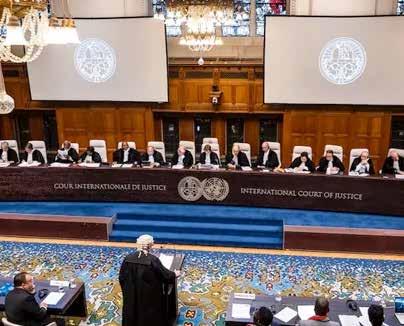
cal alignment that should be a matter of public concern. When an NGO that has long been supported by Western donors with such clear political agendas echoes the positions of its funders on critical moral questions — we are entitled to ask difficult questions.
South Africa’s foreign policy must reflect the values of its people, not the preferences of foreign donors. Dropping the genocide case
at the ICJ, as Gumede suggests, would not be a mere technocratic adjustment. It would be a historic betrayal. It would signal that South Africa’s role as a voice for the oppressed can be bartered away for investment deals and diplomatic handshakes. The Palestinian people — and the world — deserve better.
Gumede is entitled to his opinion. But when that opinion aligns so seamlessly


Give your taste buds an exquisite experience with our freshly prepared food and warm welcoming team.
Seated in our open dining area, enjoy our cuisine and drinks stop by our coffee bar for delicious desserts and different coffee's.
Our venues which seat 250 people collectively (Hall 150 seater and lapa 100 seater) are on the premises. The venues include catering, crockery, cutlery, glasses as well as an excellent team to serve your function.
29 Lennox Road, Windermere, Durban 4000
WhatsApp or call: 078 655 8754 receptionatsunkist@gmail.com
with the geopolitical agenda of Israel’s most powerful allies, and when it is promoted through an organisation so deeply entangled with US funders, we are obligated to respond with principled critique. South Africa has many problems. The ANC has many failings. But our stance on Palestine has been clear, brave, and principled. That must not change.
Dr Buccus is editor of AlQalam



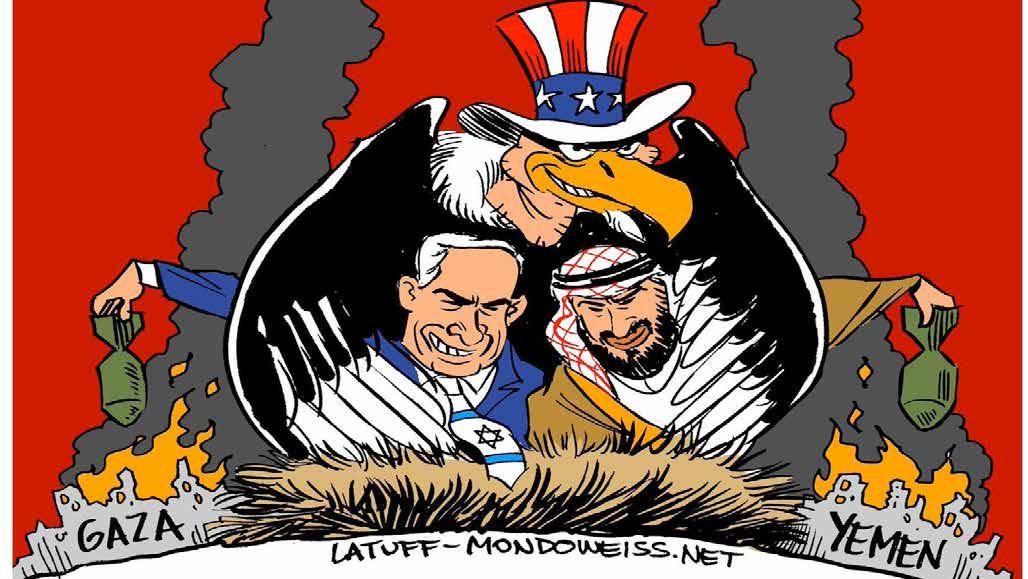


Has the United States succeeded in its objectives against Yemen? Can we say that the Port of Eilat is still open? Can we claim that the Israelis are protected from Yemeni strikes, when they themselves have announced a casualty near the U.S. embassy following a Yemeni drone attack, and frequently report injuries from hypersonic missiles?
Recently, Yemeni forces have succeeded in breaching all of the West’s fortifications and the most advanced defense systems modern science has produced. Today, Tel Aviv— one of the most heavily fortified cities in the world— finds its security compromised in the face of Yemeni attacks in support of Gaza.
The American deterrence system has collapsed, and now we witness a de facto air blockade imposed on Israel by Yemen. How can Israel and the United States launch any future military escalation or open a new war front when such a major
vulnerability exists?
Yemen is defending Gaza and standing with the Palestinian people. If Yemen were to stop supporting Gaza, would the genocide in Gaza cease? On the contrary — such a withdrawal would only encourage the continuation of these crimes in a state of silence, with no serious objections from the world.
Furthermore, it is the Palestinian people who are best positioned to evaluate the effectiveness of Yemen’s supportive operations.
The United States possesses the most powerful military in the world. Yet the question remains: Has it been able to ensure the passage of an Israeli ship or break the Yemeni blockade imposed on Israel? Has it managed to recover a single Israeli prisoner after more than a year and a half? The answer to all these questions is no — they have failed, despite their immense power.
Yemen and Gaza, which have been besieged and devastated for years, cannot be
judged for their inability to achieve total victory. Rather, the U.S. and Israel should be judged for their failures.
In addition to the U.S.’s clear failure in its campaign against Yemen, they spread lies and make unsubstantiated claims. Following the explosive Signal app leaks that revealed secret U.S. military operations against Yemen, Trump claimed that he had ended the Yemeni military campaign and achieved victories — but without providing any evidence. To this day, the U.S. continues to deploy aircraft carriers, which raises the question: If the Yemeni operations had truly been dismantled, why are those carriers still stationed there? The USS Eisenhower and others remain in the northern Red Sea, unable to move freely in the region.
Meanwhile, international ships not affiliated with Israel or the U.S. — such as European and Chinese vessels — pass freely and safely.
Today, Yemen defends human rights by preventing
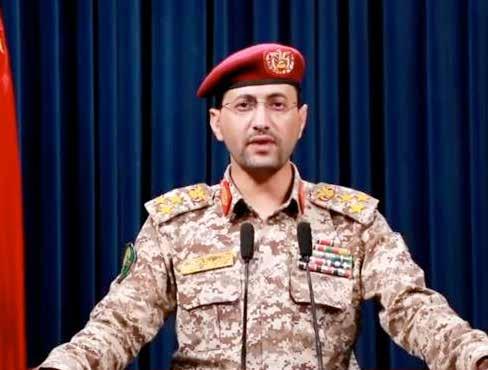
Israeli ships that transport weapons used to annihilate the Palestinian people. In doing so, Yemen upholds the very human rights that the U.S. has abandoned and lied about for years. We have seen Trump’s statements about displacing the people of Gaza from their land, and
how students in the U.S. are jailed for expressing their opposition to the genocide of Palestinians.
Currently, the U.S. behaves like a pirate power in the Red Sea, militarizing the waters, aiding Israel in its campaign against the Palestinian people, and acting with arrogance.
confronts this arrogance by imposing real sanctions on the U.S. and Israel, both of whom have failed — militarily and morally.

By Iqbal
In his perceptive observation many may consider to be satire, Alon
knowing anything about the history of Zionism, they always felt strange to him, but never magical, the way a true forest feels.
“Like those who planted them, they emit a sense of shallowness and fragility”.
He accused “soulless Zionists” for having planted European pine trees throughout Palestine meant to make the landscape look and feel like their Switzerland or Romanian homes (as opposed to their fake homes in Pales-
He accused “soulless Zionists” for having planted European pine trees throughout Palestine meant to make the landscape look and feel like their Switzerland or Romanian homes (as opposed to their fake homes in Palestine)
painful reality.
In a devastating critique of Israel’s genocide in Gaza, Rasha Abou Jalal and Sharif Abdel Kouddous, we are reminded that Israel’s military continues multiple airstrikes and shelling across the besieged enclave on a daily basis, “pounding homes, displacement camps, cafes, hospitals, charity kitchens, so-called ‘humanitarian zones,’ and other civilian sites”.
dawn while we were asleep. Suddenly, we woke up to a blast that felt like an earthquake. We rushed into the street and found that the five-story home of the AlKhour family had turned into a pile of rubble,” Mohammad Al-Ajla, a 37-yearold neighbor who helped retrieve the bodies, told Drop Site News.
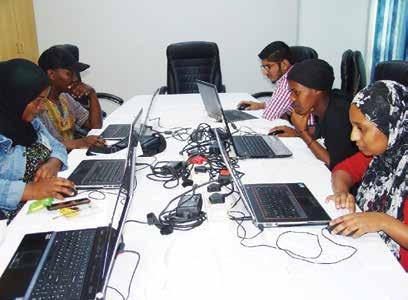
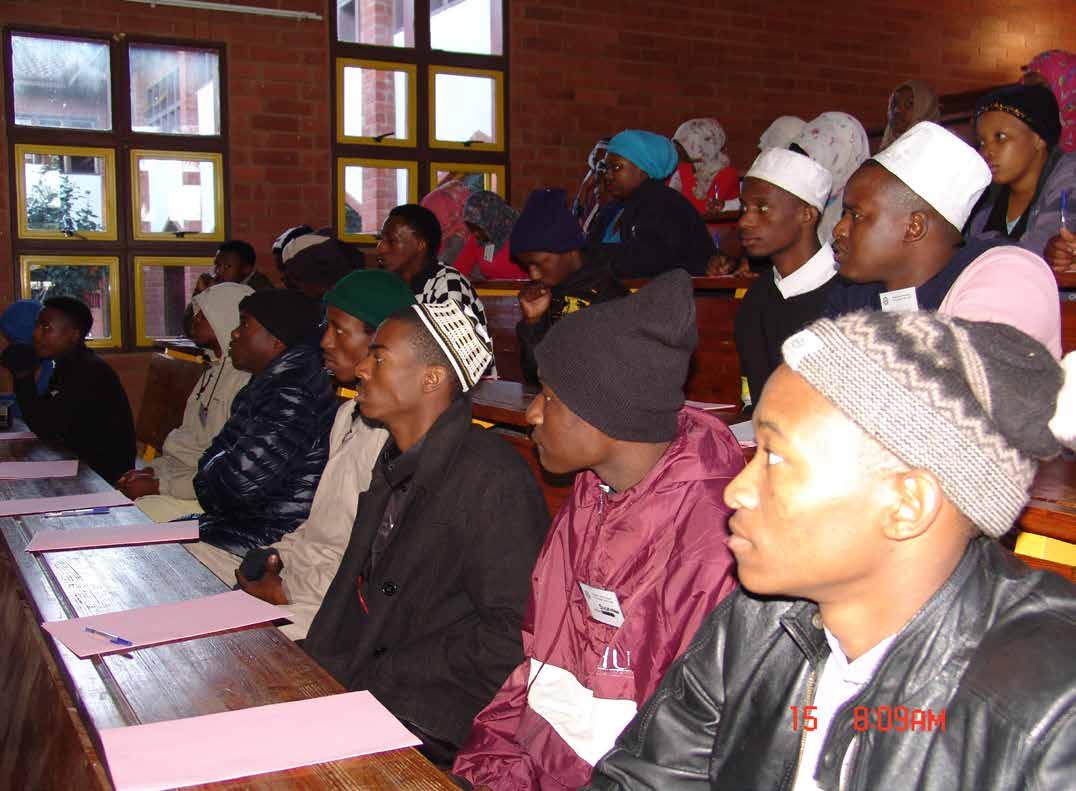
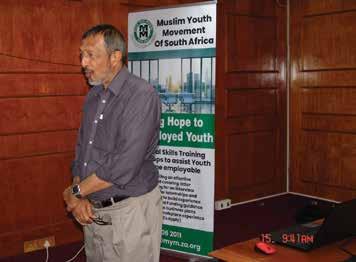
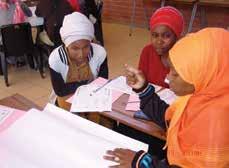
Citing the relentless bombings and bloodbath, they highlight that three generations of the Al-Khour family were wiped out when Israel bombed their family home in the al-Sabra neighbourhood in central Gaza at dawn on April 26.
The elderly patriach of the family, Talal al-Khour, his wives, daughters, sons, and grandchildren were all killed in the attack. A total of twenty-two people - including twelve children - perished, their bodies blown apart and buried under the rubble. “The airstrike occurred at
“As soon as the dust from the strike cleared, neighbors began trying to rescue members of the family. The recovery operation continued for eight straight hours. We saw bodies everywhere. There were children without heads.” The contrasts could not be clearer though many who’ve ignored the smouldering bodies of babies and families in Gaza resulting from Israel’s deliberate bombings of tents and remains of buildings, and have been directly complicit in these awful crimes, will be shedding tears for settlers escaping from forest fires.
Iqbal Jassat is an Executive Member of the Media Review Network.



On Sunday afternoon, during the Bafana Bafana vs. Malawi match at Loftus Versfeld Stadium in Pretoria, five Red Card Israel activists were arrested for peacefully protesting against Israeli apartheid. The activists wore T-shirts bearing the Red Card Israel logo and held banners calling for the exclusion of Israeli sports teams from international competitions.
This was a peaceful protest, a protest fully protected by law as well as any basic sense of democratic decency. However, the police responded with aggression and openly authoritarian intent. According to eyewitness accounts, the police manhandled and pepper-sprayed the protestors, confiscated their banners and T-shirts, and detained four of them without justification. One of the activists who was arrested is 16 years old.
Usually, activists arrested during non-violent protests
are kept in the holding cells of a police station and then given police bail. They are often released the same day or the following day. However, the detained Red Card Israel activists, now referred to as ‘the Loftus Five’, have been denied bail. The four adults have been taken to the Kgosi Mampuru prison and the teenager to Shoshanguve Prison. Their case has been postponed to May 19 for a further bail hearing.
Their lawyer asserts that the charges are unfounded and that the arrests represent a suppression of free speech and peaceful protest. The thuggish and authoritarian response to the protest by the police, the arrests, and the denial of bail have sparked outrage among progressive organisations around the country, including massbased grassroots and working-class organisations, and steps are quickly being taken to build a solidarity network.
South Africa, more than any other country, should know that sport is always political. The global boycott against South African sport by the anti-apartheid movement was an effective weapon in the struggle against the racist regime. The arrest of the Loftus Four has not only sparked outrage but also reignited memories of past struggles where sport and resistance intertwined.
The 1981 Springbok tour of New Zealand was a high
point of the boycott movement. Despite international condemnation, the New Zealand Rugby Union proceeded with the tour, triggering massive protests across the country. Over 150,000 people participated in more than 200 demonstrations, with activists arguing that allowing South Africa to compete on the international stage legitimised its apartheid regime. The protests were intense and sustained, including pitch invasions and clashes with police. One of the most dramatic moments came when activists stormed the rugby field during a game in Hamilton, forcing its cancellation.
At Eden Park in Auckland, protesters famously dropped bags of flour from a light aircraft onto the rugby field during the final game of the tour. The flour bombs, which burst in clouds of white across the pitch, became an iconic symbol of global resistance against apartheid.
Red Card Israel
Red Card Israel is an international movement that calls for the exclusion of Israeli sports teams from international competitions due to the state’s violations of human rights and war crimes in Palestine. The idea for Red Card Israel emerged in the early 2010’s, directly inspired by the international sports boycott against apartheid South Africa. Football, as the world’s most popular
sport, became a key focus, given its international visibility and its historical role in anti-apartheid activism. The campaign quickly won support from former anti-apartheid activists, including Archbishop Desmond Tutu.
Like the sporting boycotts that played a crucial role in isolating apartheid South Africa, Red Card Israel asserts that Israel’s participation in global sports normalises its occupation and the violent suppression of Palestinian rights. The campaign is part of a broader movement which seeks to apply non-violent pressure on Israel to comply with international law.
By targeting sports, Red Card Israel exposes the contradictions of international sports bodies that claim to uphold fairness and human rights while permitting a state long engaged in systematic oppression, and now perpetrating a genocide before the eyes of the world, to participate on the world stage.
Red Card Israel gained momentum through high-profile campaigns targeting FIFA, UEFA, and other major sports bodies. Activists have lobbied for Israel’s suspension from international competitions, citing its violations of Article 3 of the FIFA Statutes, which obligates member associations to respect human rights and

combat discrimination.
Global Solidarity
The protest action at Loftus Versveld on Sunday is part of an ongoing global movement by football fans, with the most famous actions being taken by Celtic FC fans in Glasgow. The club has a long left-wing tradition and in August 2016, during a Champions League qualifier against Israeli club Hapoel Be’er Sheva, Celtic fans waved Palestinian flags, resulting in an £8,619 fine from UEFA. In response, the Green Brigade, a Celtic supporters’ group, launched a fundraising campaign that raised over £170,000 for Palestinian charities.
On October 25, 2023, during a UEFA Champions League match against Atlético Madrid at Celtic Park in Glasgow, Celtic FC fans displayed hundreds of Palestinian flags and banners reading “Free Palestine” and “Victory to the Resistance.” UEFA fined Celtic £15,200 for what it described as “provocative messages of an offensive nature.”
Similarly, FC St. Pauli fans in Germany have consistently shown support for Palestine. Known for their leftist politics and anti-fascist principles, St. Pauli supporters have displayed banners and flags expressing solidarity with Palestinians during matches. These actions un-
derscore a broader movement within global football fan communities to use the sport as a platform for political expression and human rights advocacy.
The activists from Red Card Israel who organised a peaceful protest at the game at Loftus Versfeld on Sunday were part of this global movement. They were also acting in the tradition of the anti-apartheid movement, and in line with the government’s principled position on the genocide currently underway in Gaza. All this makes the response of the police to the protest at Loftus Versfeld particularly troubling, and the inaction by the government in response to the police action even more disturbing.
We have a systemic problem of police abuse in South Africa, and the state needs to intervene swiftly and decisively to ensure that the Loftus Five are treated fairly and that the right to protest is clearly affirmed and defended.
This is not the time for Cyril Ramaphosa to tell us that he is ‘shocked’. The activists need to be released, and there needs to be an investigation into the conduct of the police, and the right to peaceful protest must be clearly affirmed.
Dr Imraan Buccus is a political scientist and editor of Al-Qalam

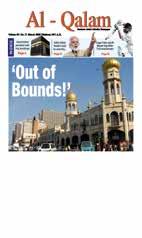


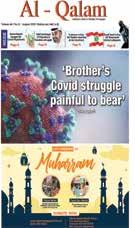

Durban is hosting a Nakba Day rally this Saturday at the Overport Secondary School from 10am to 4pm and the organisers are calling on Palestine supporters to come to the event in droves.
The meaningful solidarity activities include various speakers; poetry readings by both adults and children; film screening; kids activities; sports; cake/ cookie decoration; beaded jewellery-making; a BDS information table and there might be a Palestinian cooking demo too.
The organisers have urged attendees to bring a key to hang on the “Palestine Key Fence.”
The key is symbolic to the message of resistance and return. #weshallreturn Nakba, meaning “catastrophe” in Arabic, refers to the 1948 displacement and dispossession of Palestinians from their homes, land, and belongings, resulting in a massive refugee crisis that’s still ongoing. Similar #Nakba -
Day observations are being held in every other province in South Africa and around the world.
Why is Nakba Day being observed?
In 1947, the United Nations proposed dividing Palestine into separate Jewish and Arab states, with Jerusalem under international control. Jewish leaders accepted the plan, but Arab leaders rejected it, leading to escalating violence.
Between 1947 and 1949, around 750,000 Palestinians (about 80% of the population) were forced to flee or expelled from their homes, with many massacres, rapes, and destruction of villages reported. Israeli forces used psychological warfare tactics, including targeted violence and propaganda, to frighten Palestinians into fleeing.
Over 500 Arab-majority towns and villages were depopulated, with many completely destroyed or repopulated by Jewish Israelis. Israel also employed biological warfare by poi -
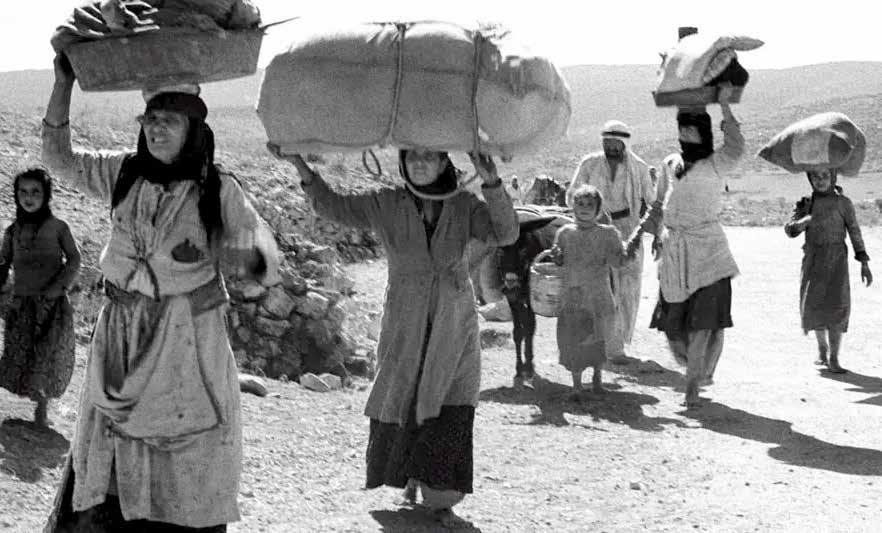
The 1949 Armistice Agreements established Israel’s borders, which included 78% of Palestine, far exceeding the 55% allocated
by the UN partition plan. Palestinian refugees were not allowed to return, and many were left stateless, living in refugee camps in neighboring countries.
The Nakba has had long-lasting effects on Pal-
estinian identity, culture, and politics, with many still demanding their right of return and an end to Israeli occupation.
Today, Palestinians commemorate Nakba Day on May 15, marking the anniversary of the catastrophe.
For more information, please contact the #NAKBADAYRALLY team.
Saydoon :
Zainab :
Hamzah :

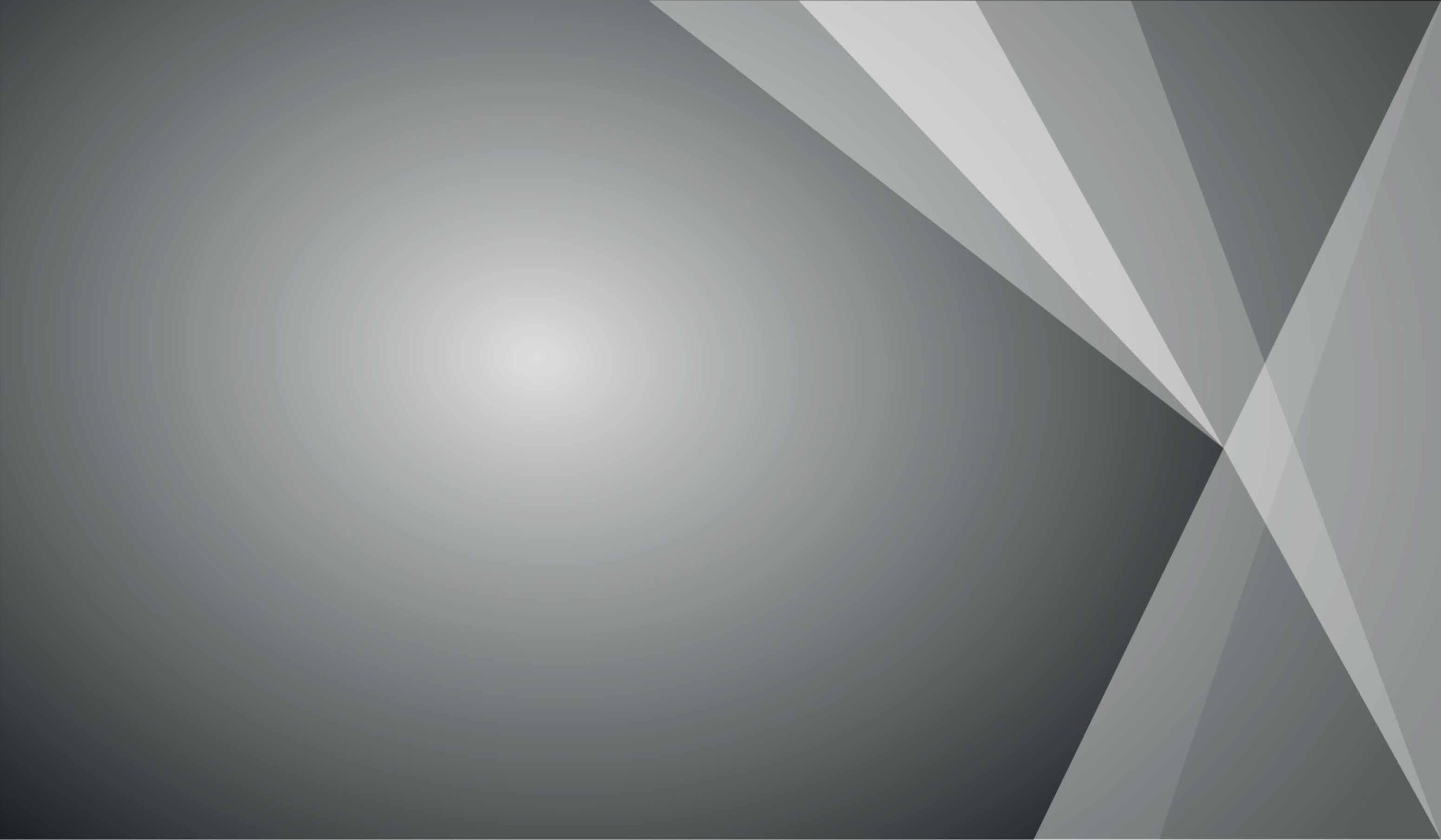
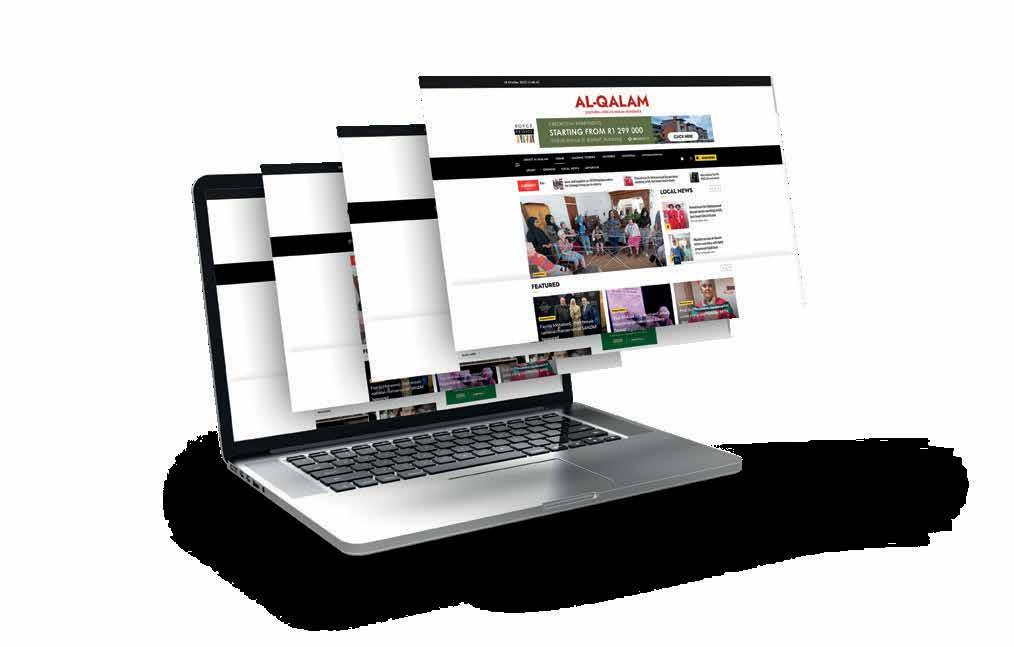
By Maysa Mustafa
Condemnations of India’s attacks roll in as many draw parallels to Israel’s behavior in Palestine Social media has been flooded with condemnations after India’s attack on Pakistan, with many suggesting it was emboldened by Israel’s assaults on Gaza and the muted response from the international community.
India said it carried out “precision strikes” on “terrorist camps” across nine sites in Pakistan, as its neighbour promised to retaliate. Pakistan said the strikes hit civilian areas, with official Pakistani sources reporting that 26 civilians were killed and 46 injured in these attacks.
India’s attack on Pakistan has driven many online to draw parallels to Israel’s common justification of its attacks on Gaza, which have killed more than 52,000 Palestinians, on unproven

claims of “terrorist activity”. The two nuclear-armed states have been on edge since last month when India blamed Pakistan for a deadly attack in India-administered Kashmir, which killed more than two dozen people.
India’s “precision strikes” came after Pakistan on 30 April said it had credible intelligence that a military incursion by India was “imminent” in the aftermath of the deadly attack on the tourist hub of Pahalgam in India-administered Kashmir that killed 26.
Pakistan has denied any involvement in the Pahalgam attack, and India has yet to provide any evidence of the attackers’ alleged links to Pakistan.
“Reminder - there is no evidence whatsoever, certainly nothing provided by India, that suggests Pakistan (or even Kashmiris) were involved in the Pahalgam attack,” journalist Sana Saeed wrote in a post on X.
“But then again, as we have learned over the last 19 months, evidence isn’t necessary anymore if you wanna bomb people.”
Although India has undertaken similar tactics in Kashmir and Pakistan before the Hamas-led attacks on southern Israel on 7 October 2023 and Israel’s subsequent war on Gaza, many online argue that Israel has “greenlit” countries like India to engage in “global violence” without any shame.
“Israel’s genocide in Gaza has greenlit global violence. If the West lets them bomb civilians with impunity, why shouldn’t India, the UAE, or others do the same? The rules based order was always a lie… now the world sees it,” one social media user posted on X. “No consequences = no limits.”
“This is what happens when genocidal actors like Israel is not held accountable to international law. India decides to break all semblance
of common sense and attacks a nuclear armed state, thinking it won’t face any consequences,” another social media user wrote.
Many online pointed out that Pakistan and its citizens condemned the attack in Pahalgam last month, and were invested in investigating the perpetrators. The Pakistani government called for an impartial international inquiry into the incident.
“Not a single Pakistani I saw took joy in the Pahalgam attack, everyone condemned it. Yet countless Indians on Twitter are openly celebrating the death of an innocent child,” one post reads. “The western media, like India’s media, are framing India’s attack as a response to Pahalgam,” journalist Azad Essa wrote on X. “That India is run by an authoritarian, anti-Muslim, Hindu right wing govt with expansionist ambitions, which has military/diplomatically supported Israel’s genocide is not seen as rel-

evant.” Pakistani officials on Wednesday attended a funeral for a boy, aged seven, who was killed in India’s strikes. Palestinians have also drawn parallels between Israel and India as they offer their thoughts to Pakistan and Kashmir online.
“India under a fascist regime clearly wants to take advantage of a world that can’t stop even the most obvious genocide ever,” Palestininan-American Imam Omar Suleiman wrote on X.
“May Allah protect Pakistan, and the innocent people of the world at the mercy of small tyrants with big weapons.” While there are many parallels to be drawn between Israel and India, many social media users say that it is “dangerous” to draw a parallel between Pakistan and Palestine and “the actual Palestine analogue” is Kashmir.
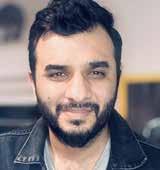
In addition, many have highlighted that the people of Kashmir will “lose more than anyone else” in a war between India and Pakistan.
“The worst part is, while India and Pakistan posture for power, it’s Kashmiris on both sides who pay the price, school children, farmers, underdog towns no one can pronounce, will die before the world learns their names,” one post reads.
“The Indian government and its Hindutva nationalists are evil but you can’t compare Pakistan to Palestine considering the former is a nuclear weapon with a proper military to fend for itself while the latter doesn’t,” one social media user posted.

PACKED WITH NUTRITION AND FLAVOUR, SUNPICK PURE SUNFLOWER OIL IS PERFECT FOR HOME-COOKS WHO CARE ABOUT QUALITY.
Ready to make your dishes shine?




